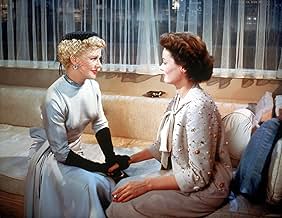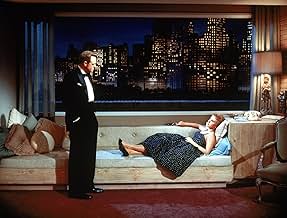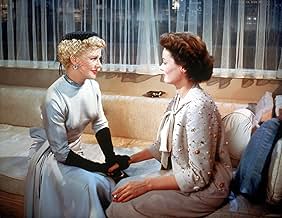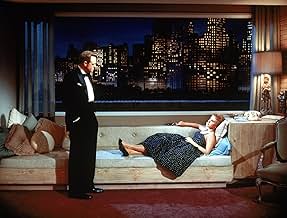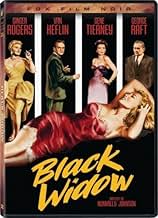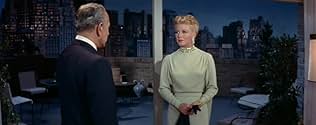AVALIAÇÃO DA IMDb
6,7/10
3,5 mil
SUA AVALIAÇÃO
Adicionar um enredo no seu idiomaAn aspiring young writer insinuates herself into the life of a Broadway producer only to meet an unexpected fate.An aspiring young writer insinuates herself into the life of a Broadway producer only to meet an unexpected fate.An aspiring young writer insinuates herself into the life of a Broadway producer only to meet an unexpected fate.
- Direção
- Roteiristas
- Artistas
Mabel Albertson
- Sylvia
- (não creditado)
Edward Astran
- Party Guest
- (não creditado)
Bea Benaderet
- Mrs. Franklin Walsh
- (não creditado)
Mary Benoit
- Party Guest
- (não creditado)
Nesdon Booth
- Police A.P.B. Man
- (não creditado)
Paul Bradley
- Party Guest
- (não creditado)
Steve Carruthers
- Party Guest
- (não creditado)
- Direção
- Roteiristas
- Elenco e equipe completos
- Produção, bilheteria e muito mais no IMDbPro
Avaliações em destaque
I greatly enjoyed this Cinemascope, Stereo-Sound romp, but mainly as a Guilty Pleasure, as it's a film very much of it's time, with mismatched acting styles, lush, unbelievable sets, a central premise that doesn't make much sense (lending your expensive apartment to a just-met down-and-out writer while your wife's away),and an early attempt to make visual sense of the then-new wide-screen process.
Why do I like it? Ginger Rogers is way over the top, popping on and off screen with snappy diva one-liners, like Margo Channing on pep pills; Peggy Ann Garner plays a subversive Lolita, crazy-seductive and irresistible, and you can even spot Aaron Spelling towards the end in a bit part as a theatre employee.
The palette is loaded with pastel colors so popular in the 1950's, and the whole thing is sort of a mild domestic whodunit whipped up into an anemic Douglas Sirk confection. Great it ain't, but because of Rogers, Van Heflin, Gene Tierney (who has very little to do but does it beautifully) and Reginald Gardner, I found it greatly entertaining.
Why do I like it? Ginger Rogers is way over the top, popping on and off screen with snappy diva one-liners, like Margo Channing on pep pills; Peggy Ann Garner plays a subversive Lolita, crazy-seductive and irresistible, and you can even spot Aaron Spelling towards the end in a bit part as a theatre employee.
The palette is loaded with pastel colors so popular in the 1950's, and the whole thing is sort of a mild domestic whodunit whipped up into an anemic Douglas Sirk confection. Great it ain't, but because of Rogers, Van Heflin, Gene Tierney (who has very little to do but does it beautifully) and Reginald Gardner, I found it greatly entertaining.
Black Widow (1954)
An early full color Cinemascope drama, loaded with starts, and written by a high powered but somewhat forgotten stage and screen writer of the 40s and 50s, Nunnally Johnson. And this is one of a handful of films he directed, too. It's really quite a fully blossomed drama, and it grows with complexity as it goes. And it's packed with stars. The leading man has always impressed me even though he's not the handsome or powerful sort that usually commands the first credits, Van Heflin. he's really amazing, subtle and perfectly sophisticated and well meaning and (eventually) tortured.
His wife is played with usual cool cheerfulness by Gene Tierney, and their neighbor and friend is a haughty and ridiculous (perfectly so) Ginger Rogers. Rogers takes her role to the hilt, both in arrogance and frivolity and later in emotional breakdown.
What ensues is not just highbrow Broadway theater culture, but eventually a criminal (or psychologically suspenseful) tidal wave sweeps over the relatively lightweight beginnings, and the effect is kind of remarkable in its own way. I mean, it's so completely theatrical and melodramatic, and yet it really works as an interpersonal and heartfelt (and probing) drama, too. The writing is smart, nuanced, and it plays the line of being exactly what it is--meaning that it's about the very world that Johnson lives in.
The cop in this case is George Raft, always a little stiff and stiff again here, but he does his job. The seductress who is the center of all these talents is Peggy Ann Garner. Who is she? Well, after several years of being a successful child actress, and except for a small role in an obscure 1951 Fred Zinnemann film as an adult, Garner was a television actress (including some t.v. movies) bouncing from one series to another. Then, at the end of her career, she had small roles in three more features. And in many ways, she's the weak link here--she's supposed to be sleeping her way to success in the theater world, and yet there's something not quite right about her in this role. I suppose I underestimate middle aged rich men.
The plot this girl weaves for those around her is elaborate and devilish. And when it goes wrong for her, it really goes wrong for our main man Heflin. At the point the film is very much like Hitchcock film, with the apparently innocent man accused of a crime. Unlike Hitchcock, Johnson uses flashbacks at key points near the end., which do their job but also have a way of deflating the suspense.
See for yourself!
An early full color Cinemascope drama, loaded with starts, and written by a high powered but somewhat forgotten stage and screen writer of the 40s and 50s, Nunnally Johnson. And this is one of a handful of films he directed, too. It's really quite a fully blossomed drama, and it grows with complexity as it goes. And it's packed with stars. The leading man has always impressed me even though he's not the handsome or powerful sort that usually commands the first credits, Van Heflin. he's really amazing, subtle and perfectly sophisticated and well meaning and (eventually) tortured.
His wife is played with usual cool cheerfulness by Gene Tierney, and their neighbor and friend is a haughty and ridiculous (perfectly so) Ginger Rogers. Rogers takes her role to the hilt, both in arrogance and frivolity and later in emotional breakdown.
What ensues is not just highbrow Broadway theater culture, but eventually a criminal (or psychologically suspenseful) tidal wave sweeps over the relatively lightweight beginnings, and the effect is kind of remarkable in its own way. I mean, it's so completely theatrical and melodramatic, and yet it really works as an interpersonal and heartfelt (and probing) drama, too. The writing is smart, nuanced, and it plays the line of being exactly what it is--meaning that it's about the very world that Johnson lives in.
The cop in this case is George Raft, always a little stiff and stiff again here, but he does his job. The seductress who is the center of all these talents is Peggy Ann Garner. Who is she? Well, after several years of being a successful child actress, and except for a small role in an obscure 1951 Fred Zinnemann film as an adult, Garner was a television actress (including some t.v. movies) bouncing from one series to another. Then, at the end of her career, she had small roles in three more features. And in many ways, she's the weak link here--she's supposed to be sleeping her way to success in the theater world, and yet there's something not quite right about her in this role. I suppose I underestimate middle aged rich men.
The plot this girl weaves for those around her is elaborate and devilish. And when it goes wrong for her, it really goes wrong for our main man Heflin. At the point the film is very much like Hitchcock film, with the apparently innocent man accused of a crime. Unlike Hitchcock, Johnson uses flashbacks at key points near the end., which do their job but also have a way of deflating the suspense.
See for yourself!
Very impressive cast in a better than OK murder mystery. With touches of All About Eve and Sunset Boulevard, this film moves along at a good clip with only a few draggy scenes.
Ginger Rogers plays a bitchy stage diva who is married to a mousy man (Reginald Gardiner) and lives in the same apartment building as her producer (Van Heflin) who is also married to an actress (Gene Tierney). While Tierney is away, Heflin attends one of Rogers' big parties and meets a quiet young woman (Peggy Ann Garner) who actually has no real interest in acting or theatre. She is a writer. He invites her out for a real meal and she insinuates herself into his life.
The party scene is pretty funny with Ginger ripping off several "Margo Channing" ripostes at the expense of Bea Benaderet. Heflin is infatuated with the serious young Garner whose only link to the stage is her uncle (Otto Kruger) who is an actor. She also befriends a young brother and sister from Boston (Virginia Leith & Skip Homeier) who are doing the Greenwicj Village beatnik thing.
Well there is an apparent suicide and that brings in a detective (George Raft) who hounds everyone. When the suicide is discovered to be a murder, things get really dicey for all involved.
For the most part the acting is solid. I never liked Heflin but he's OK in this film. Rogers plays the diva well and looks great. Tierney gets a few good scenes. Raft is solid as the detective. Gardiner is especially good, but Peggy Ann Garner, a top child star of the 40s is quite excellent as the moody and strange young writer. Oddly, she didn't make a film after this one for another 12 years. She reminds me here of Barbara Bel Geddes. Bea Benaderet as the party guest, Otto Kruger as the uncle, and Leith and Homeier as the beatniks are all good.
Also in this film are Cathleen Nesbitt oddly cast as a cleaning lady, Mabel Albertson is the bar owner, Hilda Simms plays the sympathetic waitress, and believe it or not, the gangly witness from the movie theater is Aaron Spelling, who would have a major career as a TV producer.
Worth a watch.
Ginger Rogers plays a bitchy stage diva who is married to a mousy man (Reginald Gardiner) and lives in the same apartment building as her producer (Van Heflin) who is also married to an actress (Gene Tierney). While Tierney is away, Heflin attends one of Rogers' big parties and meets a quiet young woman (Peggy Ann Garner) who actually has no real interest in acting or theatre. She is a writer. He invites her out for a real meal and she insinuates herself into his life.
The party scene is pretty funny with Ginger ripping off several "Margo Channing" ripostes at the expense of Bea Benaderet. Heflin is infatuated with the serious young Garner whose only link to the stage is her uncle (Otto Kruger) who is an actor. She also befriends a young brother and sister from Boston (Virginia Leith & Skip Homeier) who are doing the Greenwicj Village beatnik thing.
Well there is an apparent suicide and that brings in a detective (George Raft) who hounds everyone. When the suicide is discovered to be a murder, things get really dicey for all involved.
For the most part the acting is solid. I never liked Heflin but he's OK in this film. Rogers plays the diva well and looks great. Tierney gets a few good scenes. Raft is solid as the detective. Gardiner is especially good, but Peggy Ann Garner, a top child star of the 40s is quite excellent as the moody and strange young writer. Oddly, she didn't make a film after this one for another 12 years. She reminds me here of Barbara Bel Geddes. Bea Benaderet as the party guest, Otto Kruger as the uncle, and Leith and Homeier as the beatniks are all good.
Also in this film are Cathleen Nesbitt oddly cast as a cleaning lady, Mabel Albertson is the bar owner, Hilda Simms plays the sympathetic waitress, and believe it or not, the gangly witness from the movie theater is Aaron Spelling, who would have a major career as a TV producer.
Worth a watch.
No matter how pretentious the cocktail party, never escape by asking another wallflower out for dinner. That was theatrical producer Van Heflin's mistake when, on the terrace of Broadway diva Ginger Rogers' apartment, he took pity on hopeful young writer Peggy Ann Garner. Just a few months later, she was found hanged in the bathroom of his apartment.
It was all very innocent, though. While his wife, another star on the Rialto (Gene Tierney), was away tending to her ailing mother, Heflin let Garner use his place as a daytime office so she could write in quiet comfort. (Well, not so quiet: She listens to `The Dance of the Seven Veils' from Salome incessantly and fixates on a line from the opera: `The mystery of love is stronger than the mystery of death.') But when it turns out not only that she was pregnant but that she was murdered, the police sensibly enough find in Heflin their prime suspect.
Black Widow, written and directed by Nunnally Johnson, assembles an impressive array of Hollywood luminaries across whose resumés long shadows were beginning to creep. Along with Rogers, Tierney and Heflin, there's George Raft as a police detective, Otto Krueger as Garner's actor uncle and Reginald Gardiner as Rogers' whipped spouse. It's an ensemble-cast, 40s-high-style mystery movie, made about a decade too late but not too much the worse for that (even allowing for its color and Cinemascope).
Heflin's technically the center of the movie the patsy racing around to prove his innocence. But the meatier parts go to the women, except for Tierney, all but wasted in the recessive role of the elegant but dutiful wife. Garner makes her abrupt exit early in the movie, but returns in startlingly revisionist flashbacks. And, as the grande dame (named `Carlotta,' perhaps in homage to another grande dame of the stage, Marie Dressler's Carlotta Vance in Dinner at Eight?), Rogers strides around in big-ticket outfits and fakes a highfalutin drama-queen accent. For most of the movie it seems like ill-fitting role for the essentially proletarian Rogers, but it's shrewdly written, and near the end she shows her true colors, becoming, briefly, sensational.
Like Repeat Performance and All About Eve, Black Widow uncoils in a high-strung, back-stabbing theatrical milieu that's now all but vanished all the money and the glamour have moved west. (Not to put too fine a point on it, but the tiny part of a struggling Greenwich Village actor is taken by television producer Aaron Spelling, now one of the richest men in Hollywood.) The movie cheats a little by withholding information essential to our reading of the characters, but it's a forgivable feint; the characters are all `types' anyhow. There is, however, one baffling omission there's not a single widow in the plot.
It was all very innocent, though. While his wife, another star on the Rialto (Gene Tierney), was away tending to her ailing mother, Heflin let Garner use his place as a daytime office so she could write in quiet comfort. (Well, not so quiet: She listens to `The Dance of the Seven Veils' from Salome incessantly and fixates on a line from the opera: `The mystery of love is stronger than the mystery of death.') But when it turns out not only that she was pregnant but that she was murdered, the police sensibly enough find in Heflin their prime suspect.
Black Widow, written and directed by Nunnally Johnson, assembles an impressive array of Hollywood luminaries across whose resumés long shadows were beginning to creep. Along with Rogers, Tierney and Heflin, there's George Raft as a police detective, Otto Krueger as Garner's actor uncle and Reginald Gardiner as Rogers' whipped spouse. It's an ensemble-cast, 40s-high-style mystery movie, made about a decade too late but not too much the worse for that (even allowing for its color and Cinemascope).
Heflin's technically the center of the movie the patsy racing around to prove his innocence. But the meatier parts go to the women, except for Tierney, all but wasted in the recessive role of the elegant but dutiful wife. Garner makes her abrupt exit early in the movie, but returns in startlingly revisionist flashbacks. And, as the grande dame (named `Carlotta,' perhaps in homage to another grande dame of the stage, Marie Dressler's Carlotta Vance in Dinner at Eight?), Rogers strides around in big-ticket outfits and fakes a highfalutin drama-queen accent. For most of the movie it seems like ill-fitting role for the essentially proletarian Rogers, but it's shrewdly written, and near the end she shows her true colors, becoming, briefly, sensational.
Like Repeat Performance and All About Eve, Black Widow uncoils in a high-strung, back-stabbing theatrical milieu that's now all but vanished all the money and the glamour have moved west. (Not to put too fine a point on it, but the tiny part of a struggling Greenwich Village actor is taken by television producer Aaron Spelling, now one of the richest men in Hollywood.) The movie cheats a little by withholding information essential to our reading of the characters, but it's a forgivable feint; the characters are all `types' anyhow. There is, however, one baffling omission there's not a single widow in the plot.
This is a colourful mystery yarn, nothing to deep or steep, with a limited pallet of suspects. In the right hands this could of been a decent "Film Noir" but the colour all rather lush and plush on top of highly unsuitable widescreen which mostly ruins the framing of the actors while giving this studio shot film an artificial look that undermines the suspense. Nonetheless, this is enjoyable froth nicely dated and a good movie for a wet and lazy afternoon.
Você sabia?
- CuriosidadesNunnally Johnson originally offered the role played by Ginger Rogers to Tallulah Bankhead, who called the writer-producer and, in a 25-minute phone conversation, gave him her reasons for rejecting the role. Rogers turned the part down as well, but had a change of heart after Johnson sent her a letter asking her to reconsider, on the proviso that she could take the relatively minor role and make it into a star-turn.
- Erros de gravaçãoWhen the suicide note is discovered by the Denvers, it is lying, uncreased, on the table. Later, during questioning, the detective produces it, folded up, from his pocket. A cop would never mishandle and mutilate evidence that way.
- Citações
[opening narration]
Peter Denver: The Black Widow, deadliest of all spiders, earned its dark title through its deplorable practice of devouring its mate.
- Cenas durante ou pós-créditosOpening credits are shown over the background of a spider web made by a black widow.
- ConexõesFeatured in Ginger Rogers at Twentieth Century Fox (2007)
- Trilhas sonorasTheme from 'Dance of the Seven Veils'
from "Salome"
by Richard Strauss
[Played occasionally throughout the picture]
Principais escolhas
Faça login para avaliar e ver a lista de recomendações personalizadas
- How long is Black Widow?Fornecido pela Alexa
Detalhes
- Data de lançamento
- País de origem
- Idioma
- Também conhecido como
- La viuda negra
- Locações de filme
- 1515 Broadway, Manhattan, Nova Iorque, Nova Iorque, EUA(Hotel Astor exterior near Times Square)
- Empresa de produção
- Consulte mais créditos da empresa na IMDbPro
Bilheteria
- Orçamento
- US$ 1.095.000 (estimativa)
- Tempo de duração
- 1 h 35 min(95 min)
- Cor
- Proporção
- 2.55 : 1
Contribua para esta página
Sugerir uma alteração ou adicionar conteúdo ausente


